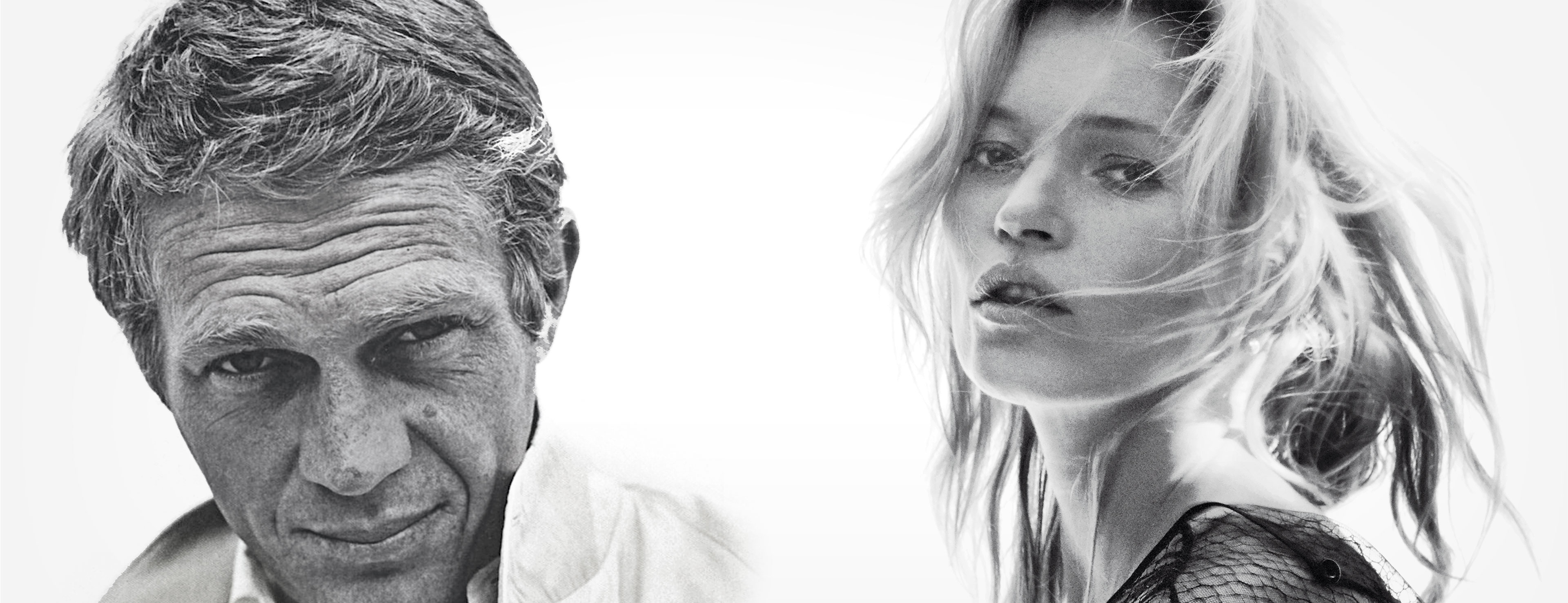A hero with weaknesses
Among the greatest Porsche enthusiasts, one occasionally finds individuals who strive to push the limits, and desire to look elegant while at it. That wish is by no means restricted to men. Designer Jil Sander, founder of a revolutionary cool look for women, drove Porsches in the 1980s. As did tennis star Martina Navratilova. And of course Kate Moss, supermodel of the 1990s. Friends gave her a black Porsche 911 for her fortieth birthday. They were aware of her weakness for rock ’n’ roll stars and their often excessive ways of life. And they knew that Moss wanted to achieve precisely that look in a Porsche. She perfectly captured the image of a new type of woman: independent, confidently stylish, and no less eager for adventure than a man. She drove the 911 in casual attire: black skinny jeans, black suede boots, and a black leather jacket.
The 2000s saw the definition of a new type of man at the wheel. We need only mention Hank Moody, played by David Duchovny, who drove his one-eyed Porsche 911 Cabriolet through the streets of Los Angeles in the TV series Californication. And there it is again, the merging of a driver and his car. The Porsche 911 in this series resembles its owner Hank: it’s a little run-down, beat-up, and still looks good even when unwashed. It has a heart and soul, like Moody himself. And even as Moody runs through Venice in a disheveled state and torn jeans, we recognize a new type of hero in him. A hero who’s aware of his weaknesses and doesn’t attempt to hide them.
Obsession as a driving force
Something similar is involved in the case of Porsche collector Magnus Walker. With his dreadlocks and long beard he seems the antithesis of many a Porsche collector. A native of England, he emigrated to the States as a student, landed in Los Angeles with just a few dollars in his pocket, and proceeded to make his fortune customizing clothing. At some point he applied these skills to the 911s in his workshop. Like Walker himself, his efforts were strictly underground. Yet the results have made him a pop star among Porsche collectors. Why? Not only because he owns a lot of Porsches, but also because his obsession is a driving force.
Actor Patrick Dempsey, who has driven Porsches in numerous races, has a philosophical take on his own collection. “Porsches are very appealing to me because the car combines male and female energy in equal parts. I also think that a Porsche embodies modernism. The first Porsche showroom in the U.S. was designed by Frank Lloyd Wright.”
The notion of reconceptualizing modernism through Porsche also preoccupies Richard Phillips, a Porsche fan and artist. In the Hamptons he watched a musician install a recording studio in his Porsche. “I thought that was brilliant. Thinking about art while you drive is like painting in your head.” And not only that. Phillips’s sports car is a Porsche 911 Turbo in Grand Prix White—an aesthetic presence and integral part of his everyday life as an artist.
For tennis star Maria Sharapova, a 911 is more than that. It gives her the sense of being a modern feminist. “It has something to do with being wild, being a woman, and having power. It’s a great feeling.” This feeling is familiar to many Porsche enthusiasts—a Porsche as the crystallization of living life in a way no one else does.
This feeling also has something to do with the luxury of driving oneself, which should continue to be the case for Porsche. A Porsche without a steering wheel? “A Porsche will always be a car that you want to and can drive yourself,” says Lutz Meschke, deputy chairman of the Porsche AG Executive Board and member of the Executive Board for Finance and IT. “Driving yourself will hopefully remain the most important thing about a Porsche for a long time to come. A Porsche sports car will be one of the last automobiles to have a steering wheel.”
Perhaps that will be yet another way in which Porsche stands out from the competition in the future—the exclusive quality of driving oneself. The steering wheel as a new definition of luxury.
For individualists
For more than thirty years, Porsche Exclusive Manufaktur has been refining and customizing cars with meticulous attention to detail. In an age of digitalization and rapidly changing technology, ever greater significance is being placed on individualization. Right now there’s a trend toward historically based designs. Many customers seek a modern car with the visuals of their “old” 911 or of an iconic vehicle from the past.
For more information, visit: porsche.com/exclusive-manufaktur
By Anne Philippi
Photos by William Claxton/DEMENT PHOTO, David Sims/TRUNK ARCHIVE

![[+]](https://files.porsche.com/filestore/image/multimedia/none/christophorus-issue385-article04-margin-01/normal/3d6fdebc-0127-11e8-bbc5-0019999cd470/porsche-normal.jpg)
![[+]](https://files.porsche.com/filestore/image/multimedia/none/christophorus-issue385-article04-margin-02/normal/3d6fdebd-0127-11e8-bbc5-0019999cd470/porsche-normal.jpg)